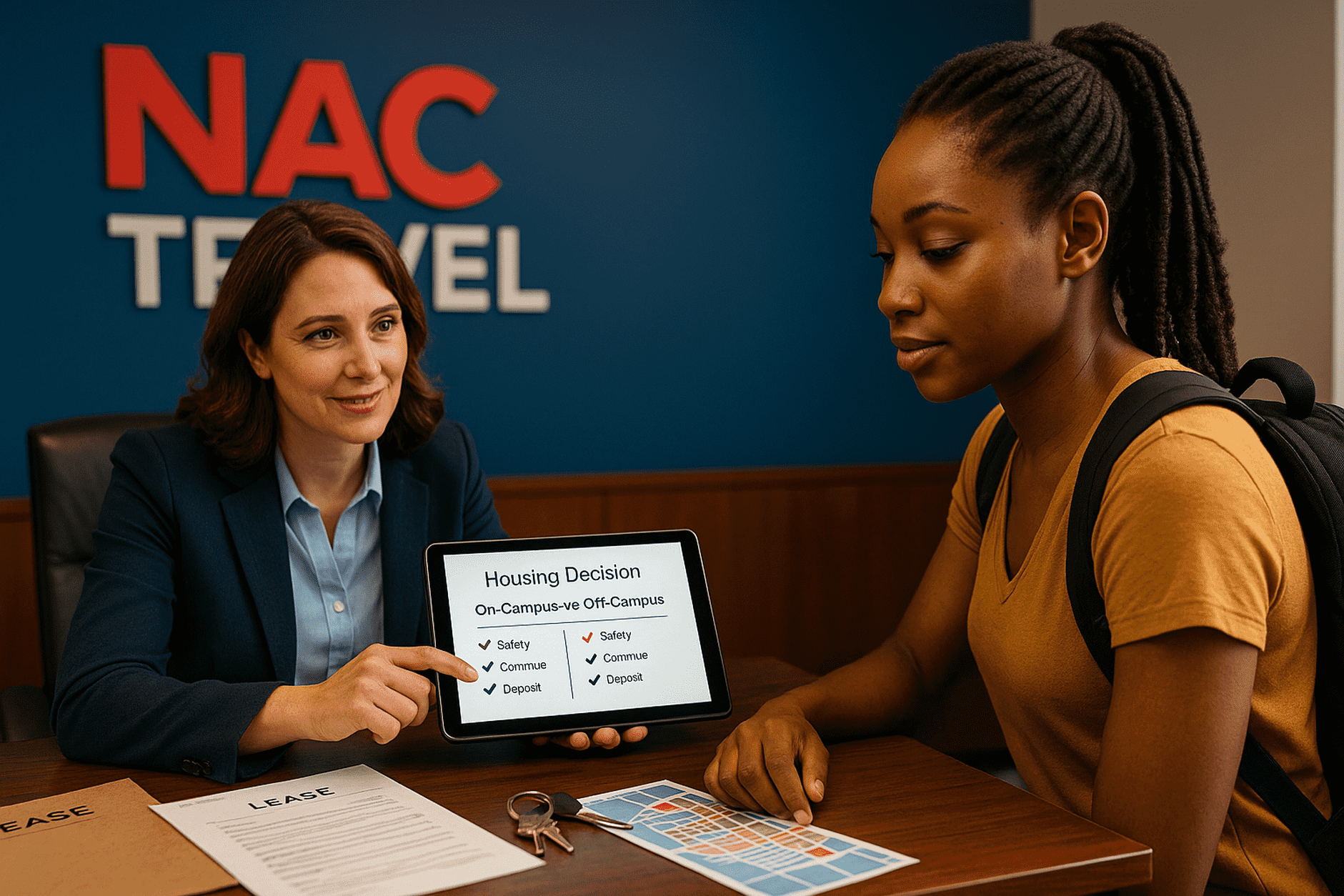Finding the right place to live can make or break your study abroad year. The best choice balances safety, commute, cost, community, and flexibility around visa timing. Here is a clear decision guide, plus how NAC Travel International helps you rank verified options and book in the right order.
Start with three anchors
-
Budget ceiling
Total monthly spend for rent, utilities, internet, transport, and a small cushion. -
Commute tolerance
Maximum minutes door to door during peak hours. -
Safety and support needs
Lighting, neighborhood reputation, late study hours, residence staff, and emergency contacts.
Write these down. They will settle most trade-offs quickly.
Quick comparison
| Factor | On-campus housing | Off-campus housing |
|---|---|---|
| Safety & support | Controlled access, residence staff, student-only community | Varies by building and area, independent responsibility |
| Commute | Walkable or short shuttle | Depends on transit, can be longer but sometimes fewer distractions |
| Cost predictability | Often bundled utilities and internet | Separate bills and variable prices, potential savings with roommates |
| Privacy & space | Single rooms or shared with rules | Greater choice, private kitchens, more control over guests |
| Lease length | Aligned to academic terms | 6 to 12 months common, sublets possible |
| Furniture | Usually furnished | May be unfurnished, furniture costs to consider |
| Deposits & guarantees | Simple deposit and residence rules | Security deposit, possible guarantor, credit checks or income proof |
| Booking timing | Clear rounds and deadlines | Market driven, need to move fast yet verify carefully |
When on-campus is the smarter first choice
-
You arrive close to orientation and want a soft landing with admin help
-
You prefer a community with residence assistants and events
-
You are nervous about neighborhoods or late-night walks
-
You need bundled costs while you learn local banking and billing
Watch for meal plan requirements, quiet hours, and stricter guest rules.
When off-campus pays off
-
You want your own kitchen and more privacy
-
You travel with a partner or friend group and can split costs
-
You can handle bills, landlord emails, and basic maintenance
-
You plan to stay beyond the academic year and want a continuous lease
Watch for scam listings, long leases that outlast your visa, and hidden costs like broker fees or parking.
Deposits, guarantors, and paperwork in plain English
-
Security deposit covers damage or unpaid rent. Expect one to two months of rent in many markets.
-
First month plus deposit up front is common. Some cities also ask for last month or a booking fee.
-
Guarantor or co-signer may be required if you lack local income history. Universities sometimes offer guarantor programs for international students.
-
Credit or background checks can be replaced with higher deposits or proof of funds if you are new to the country.
-
Read the lease for sublet rules, early exit clauses, visitor policies, and utility responsibility.
Scam shield for off-campus searches
-
Never pay a deposit before a verified viewing or a trusted virtual tour with live video
-
Use university housing portals and licensed agents first
-
Check the exact address and landlord name, then search reviews and public records where available
-
Beware listings that refuse a contract or push for wire transfers or gift cards
-
Keep communications on the platform until a contract is signed
Sequence bookings around visa timing
Before visa decision
-
Hold a refundable short stay near campus for 7 to 14 nights
-
Apply for residence halls that allow late arrival adjustments
-
Shortlist off-campus places and gather documents, but do not lock a non-refundable lease
After visa approval
-
Confirm residence allocation or sign the off-campus lease
-
Set up utilities and internet appointments for your move-in week
-
Book airport transfer and arrival window that matches your key collection time
If the visa is delayed
-
Keep the refundable short stay and inform housing of new dates
-
Ask landlords for a revised start date or a deferred lease option
First-month checklist
-
Photographs of the room on move-in day with a time stamp
-
Inventory checklist signed by both parties
-
Copies of the lease, deposit receipt, and building rules
-
Emergency numbers for building management, campus security, and local health care
-
Route card for walking or transit after dark
A hybrid strategy that works
Many students start on-campus for one term and then move off-campus once they know the city and have friends to share a place. This approach gives you support at the start and freedom later.
How NAC Travel International helps
Verified shortlists
We rank on-campus and off-campus options by safety, commute time, deposit rules, and total monthly cost. Each option shows what is included, what is extra, and what to avoid.
Scam screening
We vet listings, confirm landlords, and steer you toward university portals and licensed agents. You get a simple pass or fail for each listing with reasons.
Deposit and guarantor guidance
We explain your market’s deposit norms and help assemble a guarantor file or an alternative proof-of-funds pack if you have no credit history.
Visa-aware sequencing
We design the booking order. Refundable short stay first, then residence or lease after the visa. Your timeline includes every date and document you need.
Move-in playbook
You receive an inventory checklist, a photo guide, and a first-week schedule for utilities, student ID, banking, and mobile plans.
Bottom line
Choose housing that matches your budget, commute comfort, and safety needs, then book in a way that respects visa timing. Start supported if you are unsure, go independent when you are ready, or mix both for the best of each world. With NAC Travel International, you get a verified shortlist, scam protection, and a booking sequence that makes arrival day feel easy.
